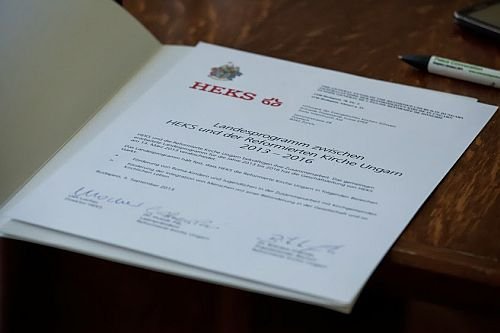In September 2013, the aid organisation of the Protestant Churches of Switzerland, Swiss Interchurch Aid (HEKS), and the Reformed Church in Hungary signed an agreement entitled “Country Programme 2014-2016,” which focuses on the support and nourishment of Roma youth in Hungary through the “strengthening of congregations to foster and to cooperate with Roma children and young persons.” Since then, the official contract has been drafted and signed by both the RCH and HEKS. Congregations are able to send proposals for support regarding Roma mission activities that aim to catch children and youth up to academic standards, improve life skills or provide school programme activities. To understand a bit more about the collaboration, we spoke with the RCH’s project coordinator, Petra Dienes, about the details.
Why does HEKS support mainly the improvement of Gypsy children?
HEKS supports mainly development projects in areas and countries where they provide help for disadvantaged people and for people in poverty. The main focus in the agreement with the RCH is on disabled people and Roma because these groups need serious support.
For serious need, serious help: who can apply for it and how much support can they get?
Only congregations of the RCH can send in proposals. This programme is able to support a maximum of 15 congregations until 2016. There are 58,000,000 Forints available for 3 years, excluding the already supported projects. Proposals can be sent with two deadlines, till 28th February and till 31st July. HEKS writes a contract for 1-3 years, depending on its award, but projects with less than 3 years contract can be renewed per annum.

What is the aim of the project?
The project would support the work among Roma children and youth. The projects that are starting now contain activities for improvement of life skills and school programmes. The aim of both activities is to secure at least one activity weekly among the programmes that are already running, such as Bible study, trips, and play room/craft activities.
Are there any current model projects?
A Roma mission project was started in Göncruszka in 2004, which is seen as a “model programme” by many civil organisations. HEKS has supported the programme of Göncruszka and Vilmány since 2012.
Before calling for tender, the members of the Roma mission network were able to start smaller projects by sending proposals to HEKS.
Two supported projects in Büssü (Somogy county) and in the congregation on Salétrom Street in Budapest are running right now. Büssü is home to just 300 people and it is a Gypsy community in 80%.
As a scattered part of the Magyaratád Mission District, Csaba Kálmán has been responsible for the village for a year. In Büssü, three people along with the pastor go to the church, so Roma mission can be the future of Reformation in the village. The cooperation between the local government and the Reformed church is excellent: our programmes are held in the locally owned village house which was renovated by HEKS support and the volunteer work of six Gypsy fathers in order to secure a place for social activities for children. The Santa Clause celebration was already held there. It is nice to see that there is already a result of our work. In Józsefváros, mainly children from the Bible study are invited for crafts twice a week, and since January, a school programme activity has been planned and different courses are on the agenda – a chess course is already running.

Petra Dienes is the project coordinator of HCE-HEKS. Her task is to provide help for applicants from the planning phase through regular reports and on until proposal writing.
Application for Disability Sensitivity Training
According to the agreement between RCH and HEKS, the Swiss organisation also supports the work of the RCH that focuses on disability sensitivity training. Thirty congregations can participate in this programme through 2016.
This application opportunity is for congregations who want to find brothers and sisters with disabilities, want to be open to them and take them into the life of the congregation. Congregations who would like to experience the words of Paul in practice “For just as each of us has one body with many members, and these members do not all have the same function, so in Christ we, though many, form one body, and each member belongs to all the others.” (Rom 12:4, 5).
The chosen congregations will receive help from skilled supervisors for the following two years in order to start their Disability Sensitivity Training in their own congregation.
The RCH offers:
- A supervisor throughout the time of the programme
- A survey about the situation of the congregation
- prepartion of an action plan with the help of the supervisor
- sensitivity training
- assurance that the focus of the project is more than handicap ramps and handrails, and that congregations will not receive financial support
The 30 chosen congregations will develop a contract with the RCH in which they determine the terms.
written by Zsuzsanna Bagdán/reformatus.hu; translated and compiled by Rita Harda